Davey Davis's Blog, page 12
December 1, 2023
David Davis
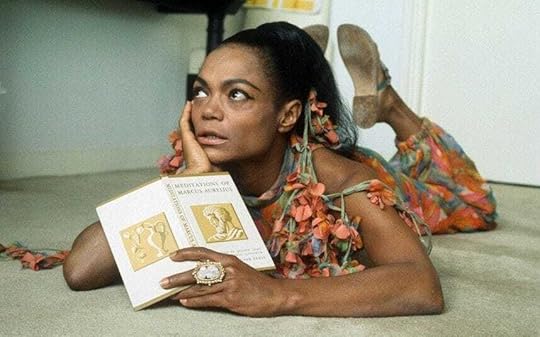
The other day, I used my lunch break to pick up two reserves at the Greenpoint branch of the Brooklyn Public Library: Mobility, by the wonderful Lydia Kiesling, and On kissing, tickling, and being bored: psychoanalytic essays on the unexamined life, by Adam Phillips. Illuminated by white-cold plate glass, the bustling open-floor room teemed with excited children and their bleary caregivers, teens hunched before computer screens, and adults taking advantage of the free books, warmth, and community programming that the library offers. Though I’ve been in retreat lately, preferring reading to most other people, I felt cheered by the continued existence of this utopian place, which despite everything hasn’t been taken from us—not yet, anyway1.
For a long time, I believed that books were a source of comfort and escape for me. But since I’ve been replacing hookups, parties, and various *events* with nights reading in bed, wrapped in my great-grandfather’s plaid bathrobe—the only physical remnant of him in my possession, besides a tablespoon of ashes, even though he loved me the most until nearly the end of his distended century on this earth—I’ve begun to wonder if this is actually true. While a book is, if nothing else, a reprieve from doomscrolling past CCTV footage of Palestinian children being murdered during a supposed ceasefire, reading hasn’t been making me feel comforted or escaped. The good spirits stoked by a visit to my local library aside, books have brought their own emotional weight to bear in 2023.
Perhaps I must blame what I’ve chosen to read. Cormac McCarthy’s The Passenger and Stella Maris, both of which came out in late 2022, a few months before the great author’s death, merge into what I can only conceive of as an elegy for human life on this planet. Turning the ultimate page of Maris, I got the sickening feeling that it was I who was being finished; I’m usually reassured by my own insignificance, but McCarthy’s circumscription of civilization by fire, one kindled by god and then supersized by us2, was a juggernaut too vast for reckoning and too tragic for catharsis. A fairly staunch non-reader of poetry, I delighted in Kay Gabriel’s A Queen in Bucks County, but her sensuous epistolary left an aftertaste of mourning: Everybody gets to be sexy, like everybody gets to die. As preparation for my third novel, Casanova 20: Or, Hot World3, I read lots about mostly white gay/MSM life in the 20th century, like Tearoom Trade: Impersonal Sex in Public Places, by Laud Humphreys; The Sexual Outlaw, by John Rechy4 (my self-loathing total top king!); In My Room and I’m Going Out Tonight, both by Guillame Dustan (thee French autofiction icon); Do Everything in the Dark, by Gary Indiana; About Ed, by Robert Glück; not to mention White, Guibert, Hollinghurst, etc. Rather than balance the resonant beauty to be found in these works, their depictions of physical suffering, direct and bureaucratic violence, and loneliness almost overwhelm it. Only the other evening, Andrew Holleran’s The Beauty of Men—a novel about a middle-aged gay man who leaves his community in New York City at the height of the AIDS crisis to care for his quadriplegic mother back home in Florida—made me cry so much I had to put down the book, lie on my yoga mat, and stare at the ceiling for a while.
Maybe books don’t always provide comfort or escape, but as my sadness reminds me, these sensations aren’t the only reason for doing anything, including reading. Anyway, reprieve is not the same thing as pleasure. And like I said, the library hasn’t been taken from us yet. I intend to keep using and supporting it when I can.
Better luck next year, right? Here’s what I’ll be reading to ring it in:
Blind Owl, by Sadegh Hedayat
Invention of Women: Making an African Sense of Western Gender Discourses, by Oyèrónkẹ́ Oyěwùmí
Running the Gauntlet, by Jim Ward
Supplication, by Nour Abi-Nakhoul5
Psycho Paths: Tracking the Serial Killer Through Contemporary American Film and Fiction, by Phillip Simpson
Fearing the Black Body: The Racial Origins of Fat Phobia, by Sabrina Strings
Man and His Symbols, Carl Jung
What’s on your list for January 2024? Share in the comments if you want.
Find me on Twitter and Instagram. Get my second novel, X, right here. Learn more about the history of this newsletter here.
1This was a weekday, so the library was open. Until last month, it was open on weekends, too, but recent budget cuts from our mercenary mayor mean many (all?) branches no longer offer Sunday service.
2Interpret “us” here most judiciously, s’il vous plait.
3More on this to come soon, hopefully.
4Rechy (who, at 92 years old, is still alive and hopefully well!), a Mexican-American author, is one of the exceptions here.
5ARC brag!
November 27, 2023
David Davis

I became very sad in an unexpected way and told him I wanted to stop. Of course, he said. We got into my bed, where he pulled my head into the space between his chin and his chest. Do you want to talk about it? he said.
When I have to talk about my feelings, but don’t yet know what they are—which is often the case if I haven’t written about them first—I feel like a bird of prey hunting something very small from very high up. I speak, which is to say that I circle, with the hope that the person listening has the patience to wait for the final descent, if it’s even worth making; that whatever’s down there is animated by flesh and blood, and not a trick of the sunlight or my own hunger.
Every November or so, I told him, his beard tickling my forehead, I make a list of the people I’m getting Christmas gifts for. For Bambi: [redacted]. For Sophie and Julia: [redacted]. What was once a ballpoint scribble in one of the 2” spiral notepads the Sunday School teacher rewards you with when you’ve memorized a new Bible verse—along with machine-woven WWJD bracelets, but somehow never candy—is typed out in my Notes app. Now in my mid-thirties, I’m not giving for one anymore, but on behalf of Jade and me as a couple, which I like very much; though we don’t believe in marriage, there are married-people things that, as a closeted kid, I dimly suspected I would never be allowed to participate in. Now, even though I did everything wrong, I can still somehow be a grown-up married person that issues birthday cards signed, in my hand, with both our names, and delivers her home-cooked vegan food to friends recovering from surgery or grieving a loss.
The people on the list have changed, too, I told him. Over time names have been added, only to later be subtracted. Forgotten, mislaid, and dead, or dead to me (or I to them, but what’s the difference?). I don’t know if the list is shorter now than it was last Christmas, or five years ago, or twenty. But with every passing year, its mutability has become oppressive. By this I mean: though a simple matter of arithmetic, the losses don’t seem to be recouped by the gains—new friends, new lovers, the birth of my godson. Instead of organizing how I will send books and novelty t-shirts and (now that I have Jade) tamales to the people I care about, the list has become a reminder of how easy it is to lose people and be lost to them.
I felt him breathing behind me, our contractions matching each other. Was the circle closing? Was my quarry attainable, or even real? Instead of asking what my holiday shopping list, that tradition-turned-wretched consumerist obligation, had to do with the sex that I’d interrupted, he pulled me closer and waited for me to continue. Though I could trace some of the sadness I felt to a lover I recently parted ways with—someone who should have been on my list and now, simply, wasn’t—and who the man holding me knew was on my mind, my circle’s gyre seemed to be expanding rather than focusing. One subtraction not only suggested others from the past, but predicted more in the future. If I could lose a lover, I could lose a friend, even if they weren’t one and the same. I feel v proud of our little life together Jade texted me last night, and yet I had little lives with my parents, and their families, and one of my sisters, too, and those lives are gone forever. If the man in my bed with me, a new friend, could be gone tomorrow—whether by his choices, or mine, or someone else’s—how could feeling good with him in that moment be a safe decision?
I did not tell him this, by the way, or not all of it. I was still circling. Instead, I asked him to stop saying something—a kind, thoughtful phrase—that he had said a few times while we were fucking, because it was too much. For that, I’m sorry.
Find me on Twitter and Instagram. Get my second novel, X, right here. Learn more about the history of this newsletter here.
November 21, 2023
David Davis: Members Only
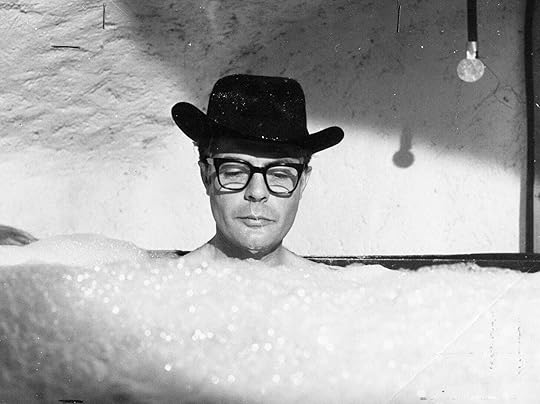
Recently, after an unplanned injury during a scene, I decided it was time for a break from S&M. For the next month or two, I’ll stick with more gentle hobbies while isolating from needless overstimulation (you know, like a Mann character in an Alpine sanatorium, or a Mann character in the Florida Keys). In this state of biochemical stasis, I’ll drop back down to my baseline, if such a thing exists; let the lowest tide pools reveal themselves.
November 15, 2023
David Davis
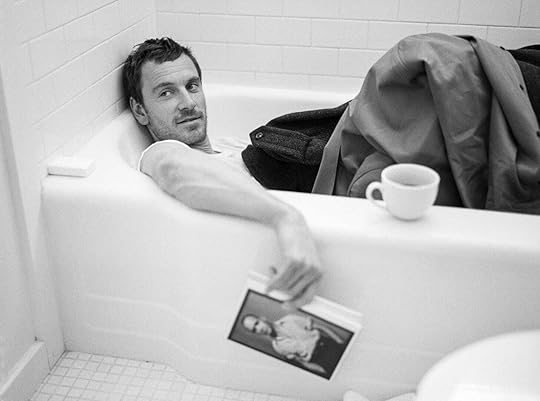
As a kid, I was a very good reader. Now that my attention span has been mutilated by social media and burnout, I’ve become a fairly bad one. Because I read multiple books at a time in small, short chunks (which I’m sure affects my retention in a negative way) and am often easily distracted, keeping up with my nightstand always feels a little harder than it should.
I started an annual book list back in 2018, which I’ve since discovered keeps me focused on reading for longer stretches, motivated to discover new writers and kinds of writing, and accountable to rooting out my own biases and blank spots1. If you’d like to read more and don’t find the idea of a book list anxiety-inducing, I recommend trying it.
I wish I had the time to write about everything I read. In lieu of that, you’ll find below a few thoughts on where my mind’s been lately.
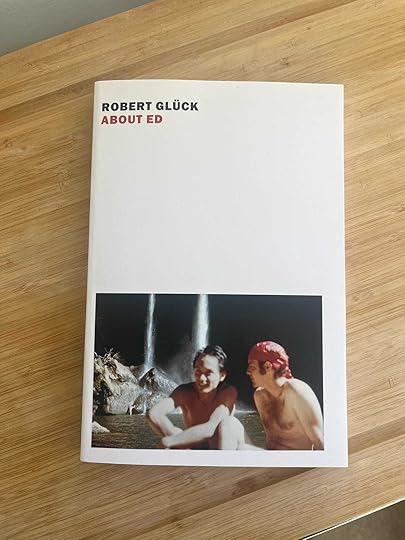 About Ed, by Robert Glück
About Ed, by Robert GlückIn May, Bambi and I went to see Bob Glück and Shiv Kotecha at the Finnish Kaleva Hall in Berkeley. Bob read a scene from About Ed, wherein he joins his friend and former lover Ed for a meal that the latter’s terminal illness has almost rendered him unable to eat: Ed is dying and Bob must watch. Over dinner, Bob’s love and resentment waltz across the horrible, tedious beauty of his friend’s suffering. I feel sleepy and itchy as though an emotional demand will be made, and what will I do then? Bob wonders. I sense his death behind the door.
The selection almost brought me to tears. Afterward, I said hello to Bob, who I interviewed a few years ago for the NYRB reissue of Margery Kempe, and greedily secured the promise of an ARC when they were available.
Like I Wished, the 2021 autofiction novel by Bob’s contemporary, Dennis Cooper, About Ed is about orienting present grief through past and future grief. Homage, portrait, AIDS memoir, novel, and death ritual, it commemorates and perpetuates the life of the artist Ed Aulerich-Sugai, who died in 1994. Funny, sexy, bereaved, and galactically aphoristic, it moves mysteriously but seductively through time and space and perspective and “fact”—just as often “about” Bob, or someone else he knows, as the eponymous departed. As Mattilda Bernstein Sycamore wrote in her NYT review, Glück writes through digression, in conversation with the inevitable and the unknown at once.
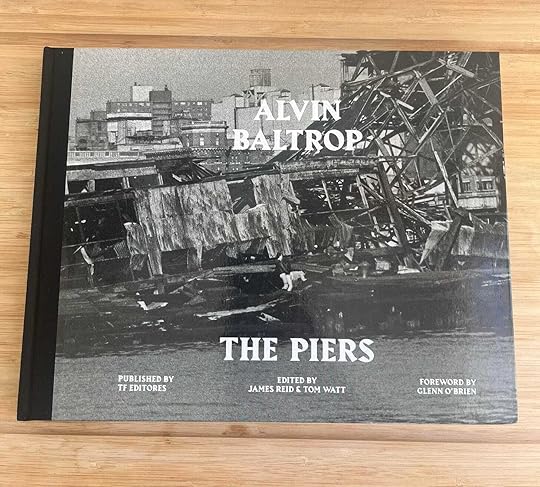 Alvin Baltrop: The Piers, ed. by James Reid and Tom Watt
Alvin Baltrop: The Piers, ed. by James Reid and Tom WattAn anniversary gift from Jade. While this Corvette of a coffee table book is stunningly curated, I was disappointed in its lack of written information about Baltrop himself. Both introduction and foreword have little to say about the photographer’s life or craft, focusing instead on the Hudson River Piers on the West Side of Manhattan where he went to meet and photograph other men from 1975 through 1986. Those old cruising grounds have now been gentrified into oblivion by businesses, condos, and institutions like the Whitney Museum of American Art, which in 2018 held a beautiful retrospective of the white artist David Wojnarowicz, who is quoted in the introduction of The Piers, while the book’s black subject is hardly to be found.
This lack could be an editorial choice; Baltrop, who often lived in precarity and didn’t become famous until after his death in 2004, is far less archived and written about than Wojnarowicz—maybe he didn’t leave any good quotes behind2. It could also be a creative one, as suggested by Glenn O’Brien’s foreword, which prefers to contextualize American post-war cruising culture (no “sissies” there, he insists!) over examining Baltrop’s role within it, as a way of maintaining the anonymity the photographer shared with his subjects.
Considering what we know of Baltrop’s history as an unsung black gay artist, if this was a choice, I don’t think it was the appropriate one, and the book suffers for it.
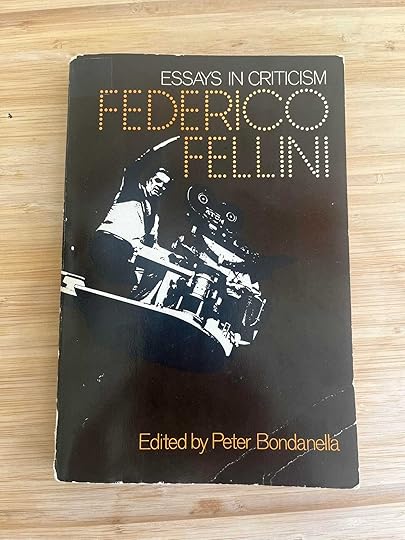 Essays in Criticism: Federico Fellini, ed. by Peter Bondanella
Essays in Criticism: Federico Fellini, ed. by Peter BondanellaI’m writing something about Fellini right now (and have before with this piece on La Strada [1954]), so stay tuned for that.
Until then, I won’t say much except that the great director’s interviews are delightfully melodramatic and deeply thoughtful. Fellini calling himself a storyteller, liar, and gossip rather than a filmmaker? 10/10. Fellini saying, I have a sort of paralysing feeling for everything concerning me, and therefore for my films? King shit.
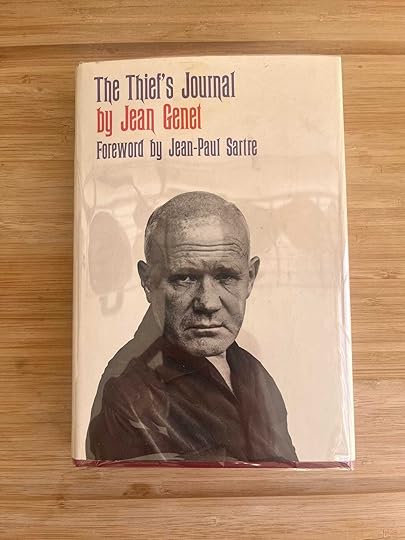 The Thief’s Journal, by Jean Genet
The Thief’s Journal, by Jean GenetI was halfway through this book when I wrote about it a few months ago, basing the piece on the marginalia I left in my ratty used paperback. Unaware that I already had a copy, Jade gave me this lovely hardcover (also for our anniversary), which feels like a sign to finally finish the job.
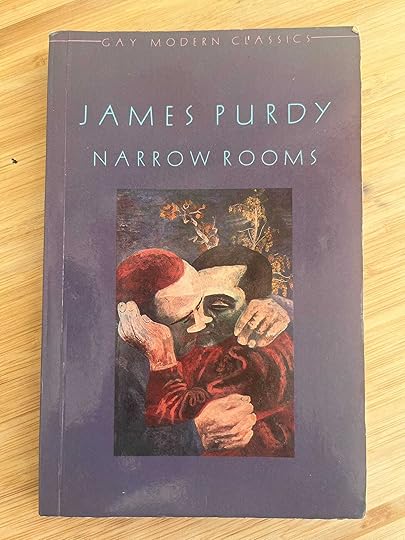 Narrow Rooms, by James Purdy
Narrow Rooms, by James PurdyDaemonumx’s description of Narrow Rooms included the words “gay crucifixion,” so I just had to borrow her copy3. My familiarity with Purdy’s short stories didn’t prepare me for the passion, violence, and perversity of Rooms’s doomed love triangle. I hope to include this novel in my eventual expansion on the necessity of the “sex scene” in a future newsletter.
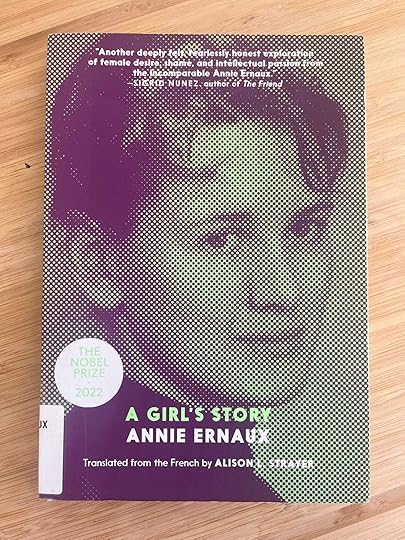 A Girl’s Story, by Annie Ernaux
A Girl’s Story, by Annie ErnauxErnaux was not on my radar before her recent Nobel, but I hadn’t felt particularly compelled to seek her out until Frankie cornered me at Bruise to insist that she’s actually doing what Kundera thinks he’s doing.
With A Girl’s Story, Ernaux revisits a character she once wanted to forget completely: herself at 18 years old. Alternating between the first person and the third, often without warning, she fluidly yokes her current identity to a girl who no longer exists (except that she does, and she’s writing this book). With the present tense lending to the strong sense that this is an active, dynamic investigation of the past, Story is a transposition of the state of image and sensation to that of words, as Ernaux writes. The tenderness with which the author handles her younger self only seems possible because of the time dividing them, bravely though does she excavate the shame surrounding the social ostracism she suffered for a man who didn’t care if she lived or died, who didn’t even care enough to properly reject her.
A Girl’s Story is a girl’s story, as it is a grown—at this point, elderly—woman’s story, but because it transcends the trauma trends of recent literature, it is also a writer’s story. Why remember? Why empathize with oneself, or one’s enemies, or one’s mother, who didn’t understand, or one’s first lover, a man who hasn’t once thought of you, though he’s a central figure in a book that you’ve written over 50 years later? Why write at all? This is what Ernaux says:
But what is the point of writing if not to unearth things, or even just one thing that cannot be reduced to any kind of psychological or sociological explanation and is not the result of a preconceived idea or demonstration but a narrative: something that emerges from the creases when a story is unfolded, and can help us understand—endure—events that occur and the things that we do?
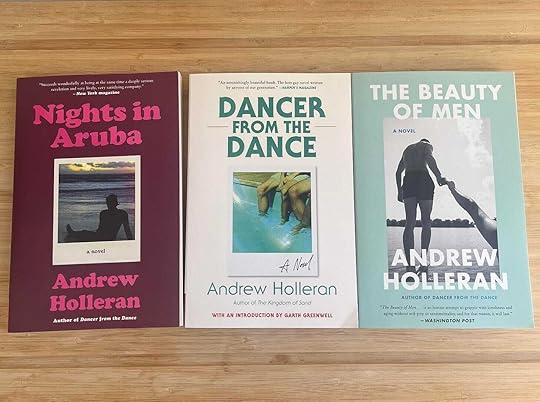 Nights in Aruba, Dancer from the Dance, and The Beauty of Men, by Andrew Holleran
Nights in Aruba, Dancer from the Dance, and The Beauty of Men, by Andrew HolleranOther than “dream blunt rotation,” I can’t say much about these freshly arrived bragging ARCs because this newsletter needs to get out the door!
Find me on Twitter and Instagram. Get my second novel, X, right here. Learn more about the history of this newsletter here.
1The recent reading’s been looking pretty white, which reminded me to get moving on a friend’s rave recommendation of Paul Gilroy’s The Black Atlantic: Modernity and Double-Consciousness.
2Here’s one from a Guardian piece about him: “Although initially terrified of the piers, I began to take these photos as a voyeur [and] soon grew determined to preserve the frightening, mad, unbelievable, violent and beautiful things that were going on at that time.”
3Daemonumx discovered Narrow Rooms thanks to Adam Baran’s Anthology Film Archives program of the same title.
November 6, 2023
David Davis
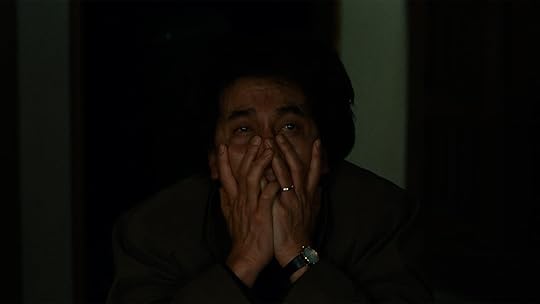
In his newest for Harper’s, William T. Vollmann goes to Reno, Nevada, to bribe three outdoor men for their stories. For some petty cash and a beer or two, Roland, Happily, and Jesse submit themselves to Vollmann’s queasy inquiries and grudging pity, which all parties know will result in no material improvement of their circumstances (unless you count the opportunity to guilt-trip an extra blanket out of their interlocutor in time for the night’s snowstorm). Himself an indoor man, Vollmann uses their suffering to reverse engineer an essay about sheltered people’s implication in the brutal institution of American homelessness.
Vollmann is sympathetic to the plight of his subjects, but he doesn’t dissemble his reasons for seeking them out. Am I my brother’s keeper? he wonders. I preferred to say that I wasn’t; it kept my expenses down. But I could be pleasant enough without committing myself to rescuing anyone. He has taken the Amtrak’s California Zephyr from Sacramento to Reno in order to gather the tragedies of impoverished persons because he needs money to avoid becoming one himself, having lost his will to work—to write—since losing his daughter the year before. My accountant warned that if I did no better in 2023 (or did I have until 2024? You see, since Lisa’s death I kept having memory troubles; you would be impressed by all the times I mislaid my raincoat, keys, train tickets, passport, and mind), the Internal Revenue Service would no longer tolerate my clever little write-offs.
Over the course of almost 9,000 words, Vollmann’s “Four Men” gradually reveals its true focus: not our country’s most vulnerable, who per our author have been grimed, smoked, frozen, and sunburned by, who knows, perhaps Fate herself, but the lies that maintain the fiction of indoorness. (Didion had it that we tell ourselves stories in order to live; perhaps we also tell ourselves stories in order to not die). The gritty, squinting Reno summoned by Vollmann—the streets’ muddy slush and casinos’ fluorescent smoke, the Truckee River’s snowmelt bloat (almost picturesque, he concedes, holding fast to a wry remove that even Twain could envy)—condenses into a slick but hard-packed sludge, as glacially slow and profoundly dissociated as the man sketching it for us.
Vollmann’s daughter died horribly and unnecessarily, and also because of a few chance circumstances that, had the author been a little luckier in a system that makes us all unlucky, could have been circumvented. But he wasn’t, and they weren’t. “Four Men” is a display case for his grief, which is, to Frankenstein my metaphors, trapped under the only clean ice this side of the Sierras: we can see it, we can feel its horror, and yet the worst is still to come, as the human toll of the American dream—people like Roland, Happily, and Jesse—is insulted by the squeamish calculus of indoor people everywhere (He had gotten a beer and the promise of twenty dollars out of me. How much could a blanket be?…) Vollmann, like me, or any other reader who can be assured that they’ll have a roof over their head, for another night at least, can choose to ignore or rationalize the fact that these men sleep in the snow. What he can’t do is not know it.
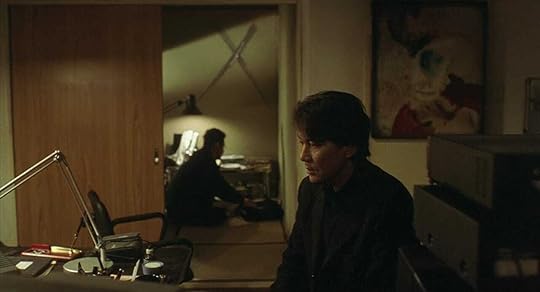
I don’t get writer’s block. Not to brag, but it’s my superpower; I have a lot of opinions. As I’ve tweeted before, Jade does a scathing impression of me on this topic, complete with hair-twirling: “i just had a thought. here’s 10k words. it’s about sex.”
But sometimes I do get depressed, which on top of being unpleasant is the only condition in which I don’t care to write as much as I normally do. I’m not blocked; I’m bereft. Because like, why? For what? There’s rounds in the chamber, but the revolver’s gathering dust. If writing is about meaning—and I often suspect that I don’t understand anything unless I’ve written through it first—and there’s none to be found, then why waste the energy?1 Chekhov’s limp dick over here.
Aspects of my current depression can certainly be distinguished from geopolitics—relationships, a health thing (it’s always a health thing with me!)—but I can’t deny its connection to the international assault on the people of Palestine2. To be clear, the feelings this stirs in me are neither compassion fatigue nor burnout. They are sadness, grief, and horror, undergirded by a nauseating lack of surprise. Fundraising, feeding, filing out into the streets with the many, many likeminded people who also refuse genocide is good for us because it is, we hope and pray, good for our friends on the inside. But everyone lucky enough to be at a physical remove from the bombs and white phosphorous has an algorithm to be haunted by, the place where terror is at once suppressed and managed, revealed and marketed. For me, those haints are, at the moment: a young woman cradling her child’s death shroud; desperate men, many of them not even old enough to be called men, frantically digging through rubble with their bare hands; a young American activist’s last living photo, her broken mouth her ultimate portrait.
Reasons to write come to me naturally. They cluster like toadstools, they crowd like curious children; I take them for granted in the most proud and selfish way. So what do I do when they don’t come? When being alive is not enough on its own, I have learned to live so as to have something to write about. I reverse engineer being alive. If reasons to write can’t be found, then they must be made, sometimes from necessity, if that ouroboros can be forced to make a lick of sense.
This one is not as tidy as I’d hoped. I seem, like Vollmann, to have lost my way along a straight line, distracted by things that feel more real than art. This being the case, I leave you with a few grafs from “Four Men,” about a man and his dying daughter, and the three men he came to know because of her, or lack of her, and how none of it mattered in the slightest. Where is the meaning? Where is the meaning?
On the day before my return I called, and again she did not answer. So I told her that I would see her in a day, and that I loved her. Wasn’t that enough? But as drunks will, she mixed up the dates and thought that I was at my studio. On the previous night the paramedics had taken her to the emergency room just as they found her, that is without shoes. They intubated her and let her sleep it off, because as a policeman had long since told me, she was a known drunk. In the morning, when she was hydrated and somewhat sober, she refused counseling for alcoholism, so out she went, in her stocking feet. Why not write her off, alongside Roland, as homeless by choice? It was only two or three miles to my studio, but it happened to be raining. She waited for me in the parking lot for hours. (I torture myself over and over with this.) Then a kind homeless man gave her water and led her to the women’s shelter, where a crazy lady threatened her all night and tried to attack her.
Had I been where she imagined or hoped I was, I would have rushed to hide the alcohol, as usual, then fed her, wrapped her in blankets on my sofa (being also bulimic she was thin and got cold easily), and stayed beside her, postponing for another day my brilliant monetizations of the miseries of others. (Oh, I was plenty compassionate, all right; I had written books to prove it.)
So I had found my three men and paid them; hadn’t I been good? What else could I have done? I had failed Lisa, so why not fail them as other indoor people did?
I am an evil person. I tried this on to see if I believed it. If that was so, then what about the indoor man at the coffee shop who had long since run out of pity for the homeless? Maybe I was better, because I paid for their stories and tried to raise other indoor people’s so-called awareness; or maybe I was worse, because I knew that the system was against them, yet did not help them more than I did. I considered this matter some more. Then, at least for five minutes, I stopped caring.
Find me on Twitter and Instagram. Get my second novel, X, right here. Learn more about the history of this newsletter here.
1Although, in that case, why preserve it?
2I have found writing by Charlotte Shane, context by Zoé Samudzi, tweets by Max Fox (whose writing I also greatly admire), and ongoing reading by outlets like Jewish Currents and N + 1 to be indispensable.
October 27, 2023
David Davis: Members Only
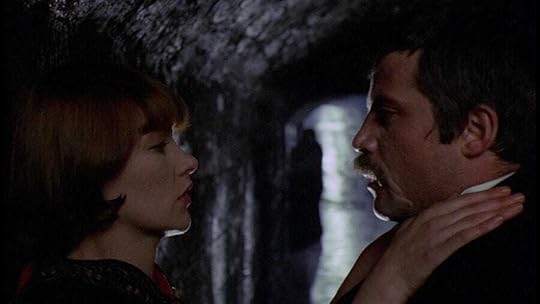
It was Sunday morning, and I wanted something gentle. When A, a wholesome, easygoing guy I had been talking to for a few months, messaged me, I invited him to my place after his jiu jitsu practice.
I found A waiting in the vestibule downstairs, sports duffle hanging from his shoulder. 6’1” and lanky, as his bio promised and photos attested. Buzzed head, strong nose, boyish seriousness. As he followed me up to my apartment, I tried to make small talk, but he responded in monosyllables, almost grunts. A dummy, I thought. I knew he was watching my ass as we ascended, the silver lining of a broken buzzer in a fourth-floor walkup.
October 19, 2023
David Davis
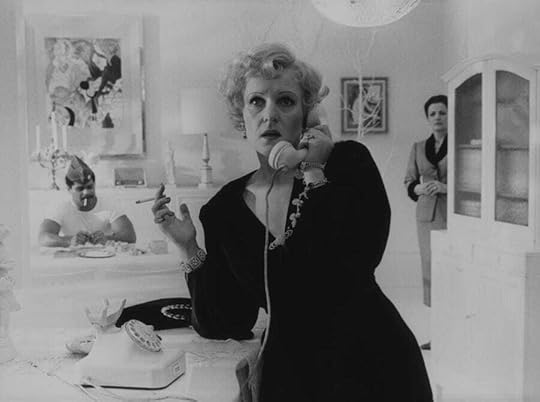
When I got a job at a dungeon, the dirtbag who owned the place organized the girls based on when they joined. According to her, you were in a litter with everyone hired around the same time as you. Litter. The girls I trained with were creatures of the same parturition; one of our rotating chores was picking up sidewalk trash in order to ingratiate ourselves with the neighbors, who knew everything.
As I began medical transition in my late twenties, a trans friend on a similar timeline referred to us as littermates. Though biologically speaking she had a few years on me, we were in our transsexual infancy together. And who had whelped us? I wondered. But I liked the idea. I still feel a cozy, familial intimacy when I learn another trans person started HRT in the spring of 2019, or got one of their surgeries in autumn of that year.
At Doll Invasion a few months ago, I met a butch who also began testosterone in the last year before the pandemic, a tidy half-century since Stonewall. We were in the pool together. They were theoretically my type, but I felt warmly platonic toward them—always a nice surprise. We’re the same age! I said, though their birthday was closer to my mom’s than to mine.
Trans anniversaries, like before/afters, are played out, but I still noticed this week that it’s almost been four years since my (second) top surgery. This means that it’s almost been four years since I met Jade.
The appropriate gift for this milestone, according to Brides magazine, is fruit or flowers. There are pink raspberries in the fridge and scarlet amaranth hung to dry—but those are for me. I’ve already picked out Jade’s anniversary gift, which is more on theme for a third anniversary. I don’t think she’ll mind.
Jade is cis, but since she came out when we met, her queerness is about the same age as my medical transition. The first time I visited her apartment, I still had tape on my chest. I discovered that she wanted to touch me. I couldn’t remember a woman ever touching me that way before (or a man, for that matter). What is a whelp’s earliest sensation: the crush of the birth canal, or the warmth of its littermates down in the grass? Her acrylics felt natural, if not normal.
🚨🇵🇸🖤 My offer from yesterday still stands: send me a receipt for a donation of ANY amount to one of the direct support orgs for Palestinians listed here by Vicky Osterweil and I’ll give you 1 free month of access to exclusive DAVID content (blood, bondage, BAD GAY archives, etc.). Thank you! 🖤🇵🇸🚨
Find me on Twitter and Instagram. Get my second novel, X, right here. Learn more about the history of this newsletter here.
October 17, 2023
David Davis 44, part 2

Read Part 1 of my new series on Method acting—what it is, and what it isn’t.
Last time, I wrote about the public misconceptions around the Method in the case of actor Jonathan Majors, who claimed through his lawyers that his “immersive Method acting style” was to blame for his alleged abuse of his coworkers on set. While the controversy surrounding these allegations is certainly an extreme example of how misconceptions of the Method can be leveraged to aid and abet violence1, I’m fascinated by their implications. Who is served by these misconceptions? Why and how do they proliferate?
To be sure, falsely claiming to be Method actor isn’t usually done with cynical ill intent. Still, if we want to be discerning about the Method and who’s doing it2, it’s clear that we can’t always rely on an actor’s (or their legal team’s) self-identification with it.
So, how do we know if someone is really a Method actor? To start, it’s best not to take the headlines for granted. As I wrote about last time, the “immersive” acting style mentioned to by Majors’ lawyers is not the same thing as the Method; nor is any approach to acting just because it is difficult, idiosyncratic, physically demanding, or “perfected” with highly-managed access to stuff like vocal training or bodybuilding. The Method is—or was—a system of rehearsal techniques that was developed by Konstantin Stanislavski and, in America, iterated on by a handful of twentieth-century theatre practitioners3, so why are do many of its contemporary invocations tend to be based on vibes, not facts?
When I read a headline like, “Timothée Chalamet Respects the Austin Butler School of Method Acting,” I go vibe-hunting with such facts as are at my disposal. What, I ask the internet, is Austin Butler’s training or educational history? What is Chalamet’s? Is any identification (whether by Butler himself, or someone else) with the Method based on anything other than, “Getting into character was weird, hard work?” As far as Butler goes, an admittedly perfunctory search doesn’t indicate any deeper engagement with the Method4 than the clickbait that invokes it.
Let’s do this exercise with someone who actually is a Method actor. Take Tom Cruise5, whose charismatic intensity, secretive relationship with the Church of Scientology, and commitment to extreme stunts—for cinema!—make him an easy mark for the vibes-based school of Method acting. But as I outlined above, none of these qualities are enough to earn Cruise the label of Method, or even Method-adjacent, actor. Here’s what does: Cruise, like Joan Fontaine, Anthony Hopkins, and many other big names you’d probably recognize, trained with Sanford Meisner, who like Lee Strasberg and Stella Adler developed his own acting technique from Stanislavski’s globally influential system.
Now, we can confirm Cruise’s Method pedigree from scanning Wiki pages, reading articles, and listening to interviews. But the proof is in the pudding, too. The way that Cruise talks about his training as an actor screams Method, even if he never mentions Meisner, Stanislavski, or the M-word itself. Here Cruise is at a presser or film festival (not sure) talking about getting into character for Michael Mann’s Collateral (2004)6.
We spent five months preparing the character in the film. I did training so that I became very competent with the weapon. Trained with live ammo, so that that’s something that I just knew and I could just…I just knew that. And the kind of work that Michael and I did together and the way he works with his actor is working on knowing the history of the character so that we could find those moments and be specific with those moments and discover them when we were shooting.
Cruise’s approach to getting into character for Collateral is certainly immersive—becoming “very competent” with a gun and absorbing the backstory of silver-maned hitman Vincent are both solid techniques to begin “living the part,” as Stanislavski refers to it. But why does “living the part” matter? As Cruise says, “[S]o that we could find those moments…when we were shooting.”
Which is to say: according to the Method, character immersion in service of mimicry is only a point of entry. Truth is not memorized, but discovered. “Plan your role consciously at first, then play it truthfully,” advises Stanislavski’s pedagogical stand-in, Tortsov, in An Actor Prepares. The “assimilation of the model” (the model being, in Cruise’s case, the character Vincent) goes deeper than “sheer imitation, which has nothing to do with creativeness.”
While a sometimes quite impressive skill, imitation is not the goal of good acting; in fact, all of that preparation—the intensive study of the character’s life, background, interests, even their way of moving and speaking—serves a purpose, not of making for better representation, but of creating the right circumstances for inspiration, and therefore creation. “All of this work on your material will help you to permeate it with your own feelings,” explains Tortsov to his acting students. “Without all this you will have no art.”
It bears repeating that Cruise was not a student of Stanislavski, but of Meisner, whose innovation on Stanislavski’s system included a greater focus on the other actors around them (as opposed to one’s own internal thoughts or feelings associated with the character that one is playing). Still, this insistence on the actor being present through the strength of their instincts and imagination, as well of as their preparation—rather than disappearing inside, or beneath, a static character—originates with the master. Cruise speaks to this in a segment from his 2004 visit to the Actor’s Studio:
“You know, I create a character, and it’s all about the story of that character. Creating an umbilical chord from myself to that piece of material…I am who I am, I am constantly looking at life, every day at people. It is my point of view, but from that character. I’m discovering this character and how he feels about things. It’s my instincts, but I don’t personally re-stimulate painful experiences. I’ve found, personally, that it’s made it difficult for me to not be there in the moment for myself. That the availability of emotion is greater for me when I’ve created it. I am the character, and I’m there in the moment, and whatever happens, happens. That’s what works for me: the power of my own imagination.”
Interestingly, this emphasis on presence and imagination aligns with the Stella Adler school of Method acting, which discourages the reliance on affective memor7. But the emphasis on authenticity, whether from Stanislavski or one of his disciples—and “[t]o be an interesting actor, you must be authentic,” claimed Meisner—flies in the face of this phenomenon of the vibes-based Method, a technique colloquially understood to mean the total disappearance of an artist into a role8.
Which brings me, I think, to the heart of this series: if the vibes-based Method can be used to disappear an actor’s agency to the extent that it can be used to disappear literal violence on their part—as is happening with Majors’ abuse allegations—how much can we trust it, or the art it’s said to produce?
ALERT: The person who writes this newsletter is in solidarity with the people of Palestine, and as you are likely aware, the situation in Gaza is growing more dire by the hour. Send me a receipt for a donation of ANY amount to one of the direct support orgs for Palestinians listed in Vicki Osterweil’s most recent newsletter and I will give you 1 free month of access to exclusive DAVID content (blood, bondage, BAD GAY archives, etc.). Thank you 🇵🇸🖤
Find me on Twitter and Instagram. Get my second novel, X, right here. Learn more about the history of this newsletter here.
1Not in the least because Majors is a black man, and regardless of whether the allegations against him are true, he will see scrutiny and reprisals that a white man in a parallel situation would not.
2Because we’re curious, and nosy, and nerdy.
3Sorry, this is starting to feel very, “Frankenstein was the scientist, not the monster!”
4I could be wrong tho, idk.
5I’m a genuine fan of the Last Movie Star, if not an apologist for him. Plus, as is the case for a lot of Millennial children, Cruise’s infamously campy early-aughts behavior with Matt Lauer and Oprah affected me in way that can only be compared with Angelina and Billy Bob, or the release of Cher’s Believe (the single from which I think actually think turned me gay).
6One of the rare Mann films I don’t enjoy. I wrote about my favorite here.
7Adler famously said, “Drawing on the emotions I experienced—for example, when my mother died—to create a role is sick and schizophrenic. If that is acting, I don’t want to do it.”
8It’s not lost on me that, Method or not, rumors, suspicions, and accusations of violence, particularly connected to the cult of which Cruise is, or once was, a high-ranking member, have dogged the actor for years.
October 6, 2023
David Davis: Members Only

Below the cut are images of big needles going into my skin, plus some blood.
Most of the time, the needles go in my back, where I can’t see them. I tell people it’s because I’m squeamish, which is true. Last night, when Daemonumx was suturing and piercing me amidst others doing similar—pussies were sewn shut; hand-sketched designs came to florid life under painstaking scalpels—I kept my eyes averted. I’m already prone to fainting as it is.
September 28, 2023
David Davis
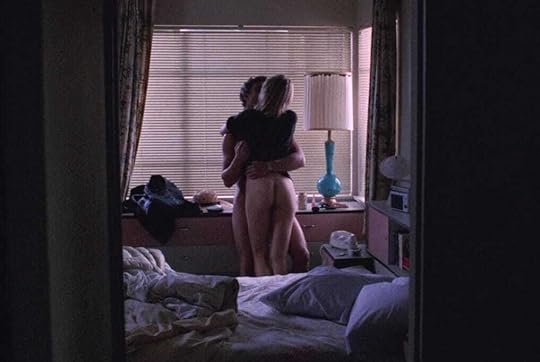
According to a novel I recently finished1, Rembrandt said that artists shouldn't travel. Is this true? I have no idea, and a cursory online search reveals nothing. My discovery of this possible apocrypha happened to coincide with my first trip to Amsterdam, where I took in, as they used to say, the Dutch painter’s The Night Watch (1642), although I missed my opportunity to spend the night with it, as did the Rijksmuseum’s 10 millionth visitor back in 2017.
For the Dutch teacher who received said opportunity, it was, according to the BBC, the chance of a lifetime—as if sleeping on a hotel cot in a massive hall that’s either ticking with institutional static or silent as the grave is something the public has long been clamoring for. The urge to slumber beside a Yevonde Middleton or a Jonathan Lyndon Chase has never once occurred to me in my years of museum wandering (and in the case of artists, like, say, the eerily wonderful Ralph Eugene Meatyard, any urge I may uncover would certainly be headed in the other direction). What marketer came up with this scheme, and was its origin a session of Mad Men-style brainstorming, or was it actually something akin to organic—a pitch from a discreet, and possibly perverted, art-lover, the kind who’s barely able to suppress the instinct to lick the glass and fondle the clay?
Perhaps artists shouldn’t travel, but sometimes we do anyway. I’ve enjoyed what little I’ve seen of Europe, as I’ve enjoyed spending time with European artists, who look upon America’s art infrastructure with a refreshing kind of horror. It’s bitterly validating to spend time with people who have enough distance to see how bleak it is here in the States, where even our most lauded artists are referred to as “content creators” and obliged to work four or five day jobs2. If you’re really good, they’ll feed your book to the AI machine, maker of our supernumerary doppels, that’s gunning for everyone’s job.
But that’s what travel’s for, isn’t it? The contrast? The juxtaposition? The uniting of the unalike to produce new knowledge and unfamiliar sensation, like meandering walks along canals of dull green water, or timeless fucking in the wet gilt of a weltering sauna, or a starry night at the museum, humbly and narrowly bedded, perhaps in one’s real-life jammies, at the feet of one of the masters, trying to recall if Painter of Light belongs to him or to America’s very own Thomas Kinkade3?
The more I think about that Dutch teacher, the more I (grudgingly) grow to appreciate his moment in the spotlight. As someone for whom sleeping around is integral to how I socialize, particularly among other gay people, sleep around is almost always metaphorical. Although I often say that my relationship with Jade fixed me—domesticated me, even—sharing unconsciousness with another person remains something I rarely do, especially if we’re fucking. For years I only did it with her, acclimating myself, sometimes painfully, to another pulse and all its potential4. Recently, as I’ve slowly begun to sleep, really sleep, with someone new, I’ve been reminded of how patient Jade was, and remains; not long ago, she pointed out that I sleep best and longest when I’m with her, and as usual, she’s right. With her beside me, my body descends to depths I never thought possible, to places of cellular repair and spiritual revitalization that I don’t know how I survived without. She smells warm and fits well, her feet pointed like a Barbie doll, with shoes to match under the bed.
To sleep together is an intimacy without witness, let alone memory. The Rijkmuseum’s remunerative cringe aside, one begins to understand the impulse behind the PR stunt.
I’m in your debt. I owe you the next installment of the Method series. I owe you a Member’s Only post that shows a little skin, maybe even a little blood. I owe you a newsletter that comes out every Monday morning at 9 am on the dot, one with an editorial calendar and crisp audio and perfectly cropped photos. Stay tuned, I suppose.
Find me on Twitter and Instagram. Get my second novel, X, right here. Learn more about the history of this newsletter here.
1Alan Hollinghurst’s resplendent The Folding Star.
2I won’t complain too much. I’m not among the most-lauded, but I’m grateful to have a day job, which affords me the stability to moonlight as a novelist.
3Neither. Apparently, that was J. M. W. Turner’s moniker until Kinkade TRADEMARKED it. Turns out Kinkade was from Placerville, CA, which really does explain a lot about his whole deal.
4In my early twenties, I had a boyfriend that I slept with almost every night, but sometimes I had to wear all my clothes—a sweatshirt and jeans, even my shoes—or spend the night on the floor, because the proximity was occasionally unbearable, and because what if I had to run away?
Davey Davis's Blog
- Davey Davis's profile
- 55 followers



